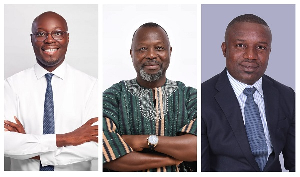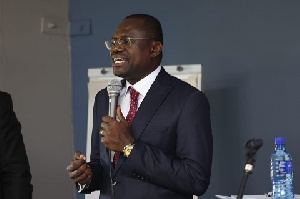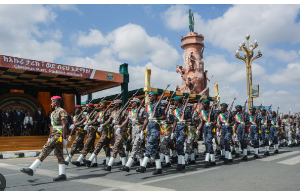The three ministerial nominees recently named by President John Dramani Mahama faced the Appointments Committee of Parliament on Monday, January 13, 2025, as part of the process to get their nominations approved.
The nominees – Minister of Finance-designate Dr Cassiel Ato Forson, Minister of Energy-designate John Jinapor, and Attorney General and Minister of Justice-designate Dr Dominic Akuritinga Ayine – were bombarded with questions on the campaign promises of President Mahama.
The nominees were also queried on recent happenings in the country, as well as their pronouncements on events during the Nana Addo Dankwa Akufo-Addo government.
Here are the top five (5) things each of the three appointees touched on:
Dr Cassiel Ato Forson:
1. Free SHS
Dr Ato Forson refuted assertions that the John Dramani Mahama government intends to cancel the Free Senior High School (Free SHS) policy introduced by the Akufo-Addo government.
He assured Ghanaians that the Free Senior High School policy is here to stay, reaffirming his party’s commitment to the initiative.
"My party’s position on Free SHS has been well articulated by President Mahama. In fact, the President of the Republic of Ghana has said it. You have the assurance from him, and I am only a servant. Who am I to say otherwise?
"Free SHS has come to stay," he assured.
2. E-Levy
Dr Cassiel Ato Forson pledged to remove the controversial E-Levy in the government’s first budget, should he be approved.
“My position on the E-Levy is well known, and I do not intend to run from it. I have written articles against the E-Levy, I championed the position against the E-Levy, and I still stand by it.
“The E-Levy is neither a direct tax, an indirect tax, nor an excise tax. I insist that the Betting Tax must be abolished, and as finance minister, I will abolish it in my first budget because it has failed,” he stated.
He also pointed out that the E-Levy discourages digital transactions and obstructs the country’s move towards a cashless economy.
3. Betting Tax
The finance minister-designate also suggested that the Betting Tax, which generally generates minimal revenue of GH¢50 million annually, would be scrapped by the government.
He indicated that the country can do without the tax, adding that taxes should not just be introduced because the government wants to increase revenue.
"The noise with the Betting Tax does not comprehend the imposition of such a tax.
“You don’t necessarily have to increase taxes before you rake in revenue," he said.
4. Road Tolls
The Minister of Finance-designate also stated that the government will reintroduce road tolls in line with the party’s 2024 manifesto.
He said that the NDC remains committed to its promise to bring back road tolls – a policy which was removed by the previous government, led by former President Nana Addo Dankwa Akufo-Addo.
“The previous government indeed removed the road toll, but getting to the end, they signalled that the road toll is coming back. They submitted it to Parliament, but it was not laid despite a concession agreement with a company to reintroduce it.
“The NDC indicated from day one that the road toll will come back. We are not running away from it. So, I can assure you we are a party that sticks to our promises. And whatever we have promised to do, we will do just that. If the road toll is a way to raise revenue, we will raise the revenue,” he added.
5. First-Year University Tuition Fees
Dr Ato Forson also touched on the “No Fee Stress Policy” President Mahama promised, which aims to take away the stress of paying academic user fees by students by paying their academic user facility fees.
The finance minister-designate, however, failed to make any commitment to the policy.
He said that he first has to get to the ministry before giving the government any advise on the policy.
Dr Dominic Akuritinga Ayine:
1. ORAL
Dr Ayine defended the legality of the Operation Recover All Loot (ORAL) initiative, describing it as a constitutionally grounded effort to promote accountability in public offices.
He clarified that the initiative has a legal basis within the framework of the 1992 Constitution.
“ORAL is constitutional. ORAL is legal. In fact, the fact that it is a non-legal body doesn’t mean that it is illegal. There is a distinction between non-legality and illegality," he stated.
2. Tribunal
The Minister of Justice and Attorney General-designate justified the government’s decision to re-establish public tribunals, stating that it aligns with the 1992 Constitution.
Dr Ayine noted that the powers of government should be exercised in accordance with the constitution, in the name and for the welfare of the people of Ghana.
"The powers of government should be exercised in accordance with this constitution, in the name and for the welfare of the people of Ghana. Governmental powers include those exercised by the judiciary of our land, and that includes the public tribunals," he noted.
He further clarified, "I believe that it is not your view, Honourable Member, that the public tribunals will not or are not part of the judiciary. They are part of the chapter on the judiciary, and so they will be bound by Chapter 5, the Human Rights provisions, and the entire constitution."
3. Reintroduction of Criminal Offences Bill
Dr Ayine also voiced his opposition to the potential reintroduction of the Criminal and Other Offences (Procedure) Amendment Bill.
He was particularly displeased with the section of the bill that touches on preliminary applications.
“If the Honourable Member [Patrick Boamah] is seeking to know from me whether, in terms of the scope and substantive content of that bill, it will be introduced as it was, my answer is no. I disagree fundamentally with some of its logic.
“The whole idea that preliminary applications are being used to delay the conclusions of trials — I disagree fundamentally. I think that lawyers shouldn’t be constrained. If there are technical issues that judges have overlooked, lawyers should bring as many applications as they can,” he said.
4. Corruption at the AG’s Office
Dr Ayine, while addressing corruption at the Office of the Attorney General, pledged to prioritise the country’s interest.
“As Attorney General of the republic, I am the republic’s lawyer, and my duty is to act solely in its best interest. I will not, in any manner, compromise the interests of the Republic of Ghana.
“For four years, the US government described the Attorney General’s Office as a corruption-free zone. During our tenure, there was no single incident of questionable judgments or misconduct in the execution of the Republic’s obligations,” he said.
5. Human Rights
The Attorney General and Minister of Justice-designate also pledged to protect the rights of every Ghanaian citizen.
He plans to achieve this with the reintroduction of a revamped public tribunal system.
“My proposal or my thinking going into this office, is that we will enact a Public Tribunals Act that will be comprehensive and that will contain restrictions in terms of the conduct of the affairs of the tribunal.”
John Jinapor:
1. Energy Sector Debt
The Minister of Energy-designate, John Jinapor, disclosed at the vetting that Ghana’s energy sector debt has increased to $3 billion.
He attributed the rise in debt to ineffective management and the growing interest on existing debts.
“When we were leaving office, the consolidated debt stock was close to $2 billion. Fortunately, I have a document summarising energy sector debts and lenders as of August 31, 2017. ESLA PLC conducted a full audit of the entire energy sector debts.
"I refer to page 17 of the document. The total energy sector liability at the time was GH₵9.4 billion. They used an exchange rate of 4.4. Using this rate, the debt was approximately $2.1 billion. Let me put on record that, at that time, when the debt was validated, it stood at $2.1 billion,” he said.
2. ECG Meters
Jinapor also discussed some issues at the Electricity Company of Ghana (ECG). He indicated that one of the challenges at the company had to do with prepaid meters.
He stated that prepaid meters should be sold to ensure effective and readily available meter usage in the country.
According to him, numerous faulty meters are not working and require attention, emphasising the importance of leveraging technology to address meter issues in the country.
“The best approach is to sell prepaid meters. My discussions with ECG revealed they have about 5.2 million meters, with only 4.8 million currently active. Approximately 3 million are not functioning properly, necessitating the replacement of at least 2.9 million meters to meet market demand.
“Individuals with faulty meters are unable to obtain replacements. We are considering the option of selling meters and licensing individuals to install them. By making them readily available, we can effectively address the problem.”
3. Privatisation of ECG
The Minister of Energy-designate outlined a six-month timeline to establish a comprehensive framework for private sector participation in the operations of the Electricity Company of Ghana (ECG).
This initiative, he said, aims to enhance efficiency and improve power distribution in the country.
“We believe there should be private sector participation. What we intend to do is to form a seven-member committee, comprising technical experts, legal minds, financial analysts, industry players, and even a consumer representative.”
4. 5 Hours of Fuel Left
Jinapor was forced to answer a question on his recent claim that the Akufo-Addo government left the country with 5 hours of fuel, which had the potential of pushing the country into serious load-shedding.
He explained that his claim was in reference to only Heavy Fuel Oil (HFO).
“I was specific. I said we had 5 hours of HFO, and it is true. We had 5 hours of HFO. I said we had zero hours of DFO for Sunon Asogli, and it is true. I gave a breakdown, but I don’t develop the headlines; I do not write the stories.
“The recording is there, and the truth is that we had 5 hours of HFO, and if there is any problem with gas supplies, we are going to lose as much as 370 megawatts in 5 hours’ time, which will lead to load-shedding. So, as far as I am concerned, that is a fact,” John Jinapor stated.
5. Ghana's upstream petroleum sector
The energy minister-designate also touched on Ghana's petroleum sector.
When asked how the upstream petroleum sector can become more attractive to investors, he noted that he would put measures in place when appointed as minister.
BAI/AE
Watch a compilation of the latest Twi news below:
General News of Tuesday, 14 January 2025
Source: www.ghanaweb.com













